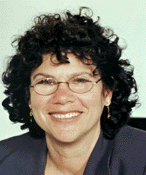|
 |
 |
Francine Berman: Steering Committee member, Super Mentoring Workshop Transcripts
Computer Science and Engineering Department
University of California San Diego
Francine Berman is Professor of Computer Science and Engineering at U. C. San Diego, Senior Fellow at the San Diego Supercomputer Center, Fellow of the ACM, and founder of the Parallel Computation Laboratory at UCSD. Her research interests over the last two decades have focused on parallel and distributed computation, and in particular the areas of programming environments, tools, and models that support high-performance computing.
|
Dr. Berman's current research focuses on the development of performance-oriented software environments for networked heterogeneous distributed resources, also known as Computational Grids or Metasystems. Dr. Berman currently co-leads the AppLeS project with Rich Wolski , focused on the development of dynamic application scheduling methods and performance technology for multi-user distributed environments. The AppLeS group collaborates widely and is developing leading edge application scheduling methodology and software for a large number of distributed high-performance and computational science applications.
Dr. Berman has served on numerous editorial boards, program and conference committees in the areas of parallel computing and Grid Computing. She is Co-chair of the Applications and Tools Requirements Working Group of the Grid Forum and is involved in the Metasystems Thrust of the National Partnership for Advanced Computational Infrastructure ( NPACI ) where she provides leadership in application scheduling issues.
|
Anita Borg: Liaison with the Institute for Women in Technology
Dr. Anita Borg is the President of the Institute for Women and Technology and a member of the research staff at Xerox's Palo Alto Research Center. Her work at the Institute has received international accolades. She works to make women's brilliance and perspective drive new and relevance technology.
Dr. Borg is a Fellow of the Association for Computing Machinery (ACM) and a member of the Board of Directors of the Computing Research Association (CRA). In 1999, she was appointed by President Clinton to the Commission on the Advancement of Women and Minorities in Science, Engineering, and Technology. During 1998-9, she served as a member of the National Academy of Engineering's Committee for the Celebration of Women in Engineering which created the Summit on Women in Engineering in May 1999. She has served on the National Research Council's Committee on Women in Science and Engineering and is currently a member of the Committees on Women of both the CRA and the ACM. She has published and served on program committees for conferences in the computer architecture and operating systems communities, and is regularly asked to speak about both her technical work and her work on behalf of women scientists and engineers.
Dr. Borg received her Ph.D. from the Courant Institute at New York University in 1981 for research in the area of operating systems synchronization efficiency. Following graduate schools, she spent four years designing and building a fault tolerant UNIX-based operating system for Auragen Systems Corp., a small startup in New Jersey, USA. In 1985, at Nixdorf Computer in Germany, she oversaw the completion of that system. Eventually, it was integrated into a successful operating system product (Targon) at Nixdorf. 1986, she joined Digital Equipment Corporation's Western Research Laboratory in Palo Alto, California, USA. There, she developed new tools for predicting the performance future microprocessor memory systems. Many of today's memory performance analysis tools are based on that work. In late 1992, Dr. Borg moved to the Network Systems Laboratory at Digital where she developed a new system for supporting efficient interorganizational communication. The existing system, Mecca, is fully web accessible and provides security, privacy filtering and most importantly, the ability to get the right information to the right people based on their position, location or interests. This work is the basis of a project at the Institute for Women and Technology to develop better tools for for communication and information sharing in large interorganizational communities.
|
 |
Throughout her career, Dr. Borg has worked to encourage women to pursue careers in computing. In 1987, she started systers, an electronic community for technical women in computing. Today, systers has 2500 members in 38 countries and provides an international community of advice and support. In 1994, Dr. Borg and Dr. Telle Whitney, then at Actel Corporation, founded the Grace Hopper Celebration of Women in Computing. This is a prestigious technical conference featuring talks by women who are changing the face of our world. The 1994 and 1997 conferences sold out. In 2000, the conference will be sponsored by the Institute for Women in Technology and will be held in Hyannis, Cape Cod, Massachussetts, USA.
In December 1997, Dr. Borg moved to Xerox PARC where she is supported in her effort to grow the independent non-profit Institute for Women and Technology. The Institute, which is supported by Xerox, Sun Microsystems, Hewlett-Packard, and Compaq works to bring women's perspective, needs and brilliance to the development of future technologies for a better world.
Dr. Borg was born "Anita Borg Naffz" in 1949 in Chicago, Illinois, USA. She grew up in Palatine, Illinois, Kaneohe, Hawaii., and Mukilteo, Washington. Her first two years of college were spent at the University of Washington in Seattle. After a two year break working in Manhattan and learning COBOL, she returned to school at New York University. She has lived in Palo Alto, California since 1986, where she is an outdoorswoman, enjoying hiking, backpacking, mountain biking, scuba diving and gardening as well as a bit of flying.
|
|
